The Primary Purpose of Business: Profit or Something More?
VerifiedAdded on 2020/10/04
|8
|2541
|44
Essay
AI Summary
This essay delves into the fundamental question of whether profit should be the sole purpose of a business. It begins by highlighting the critical role of profit in ensuring an organization's competitiveness, attracting investors, and facilitating workforce development through training and development programs. The essay then examines the advantages and disadvantages of a profit-driven approach, emphasizing the importance of balancing profit maximization with customer satisfaction and market conditions. It further explores the impact of globalization, technological advancements, and economic uncertainties on the need for profitability. The essay also critiques the sole focus on profit, arguing for the inclusion of societal objectives, stakeholder value, and ethical considerations. It emphasizes the importance of customer satisfaction, employee well-being, and social responsibility in building a strong brand image and ensuring long-term sustainability. The essay advocates for a triple bottom line approach, considering people, planet, and profit, and stresses the significance of legacy and stakeholder engagement for achieving lasting success.

Purpose of Business
Paraphrase This Document
Need a fresh take? Get an instant paraphrase of this document with our AI Paraphraser
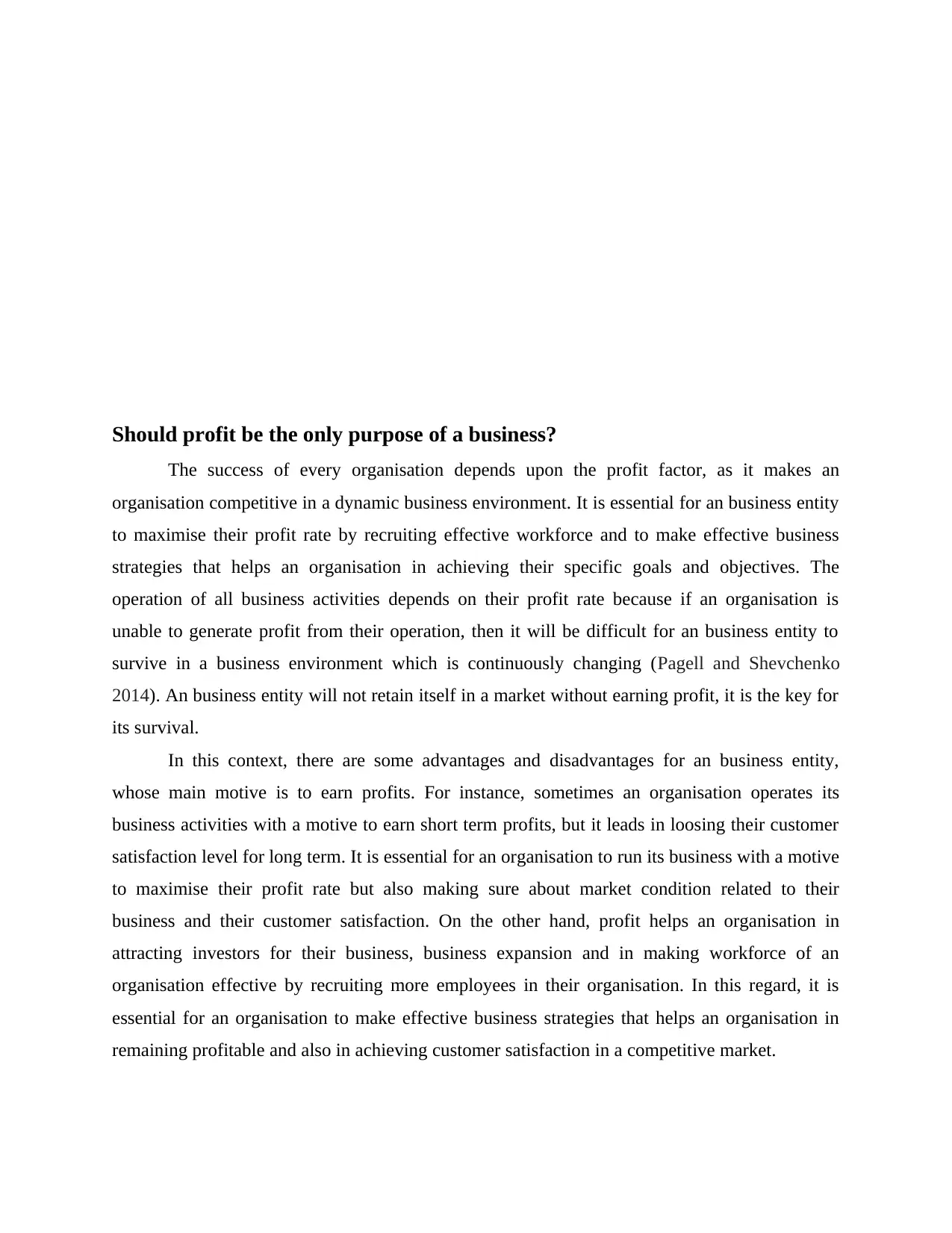
Should profit be the only purpose of a business?
The success of every organisation depends upon the profit factor, as it makes an
organisation competitive in a dynamic business environment. It is essential for an business entity
to maximise their profit rate by recruiting effective workforce and to make effective business
strategies that helps an organisation in achieving their specific goals and objectives. The
operation of all business activities depends on their profit rate because if an organisation is
unable to generate profit from their operation, then it will be difficult for an business entity to
survive in a business environment which is continuously changing (Pagell and Shevchenko
2014). An business entity will not retain itself in a market without earning profit, it is the key for
its survival.
In this context, there are some advantages and disadvantages for an business entity,
whose main motive is to earn profits. For instance, sometimes an organisation operates its
business activities with a motive to earn short term profits, but it leads in loosing their customer
satisfaction level for long term. It is essential for an organisation to run its business with a motive
to maximise their profit rate but also making sure about market condition related to their
business and their customer satisfaction. On the other hand, profit helps an organisation in
attracting investors for their business, business expansion and in making workforce of an
organisation effective by recruiting more employees in their organisation. In this regard, it is
essential for an organisation to make effective business strategies that helps an organisation in
remaining profitable and also in achieving customer satisfaction in a competitive market.
The success of every organisation depends upon the profit factor, as it makes an
organisation competitive in a dynamic business environment. It is essential for an business entity
to maximise their profit rate by recruiting effective workforce and to make effective business
strategies that helps an organisation in achieving their specific goals and objectives. The
operation of all business activities depends on their profit rate because if an organisation is
unable to generate profit from their operation, then it will be difficult for an business entity to
survive in a business environment which is continuously changing (Pagell and Shevchenko
2014). An business entity will not retain itself in a market without earning profit, it is the key for
its survival.
In this context, there are some advantages and disadvantages for an business entity,
whose main motive is to earn profits. For instance, sometimes an organisation operates its
business activities with a motive to earn short term profits, but it leads in loosing their customer
satisfaction level for long term. It is essential for an organisation to run its business with a motive
to maximise their profit rate but also making sure about market condition related to their
business and their customer satisfaction. On the other hand, profit helps an organisation in
attracting investors for their business, business expansion and in making workforce of an
organisation effective by recruiting more employees in their organisation. In this regard, it is
essential for an organisation to make effective business strategies that helps an organisation in
remaining profitable and also in achieving customer satisfaction in a competitive market.
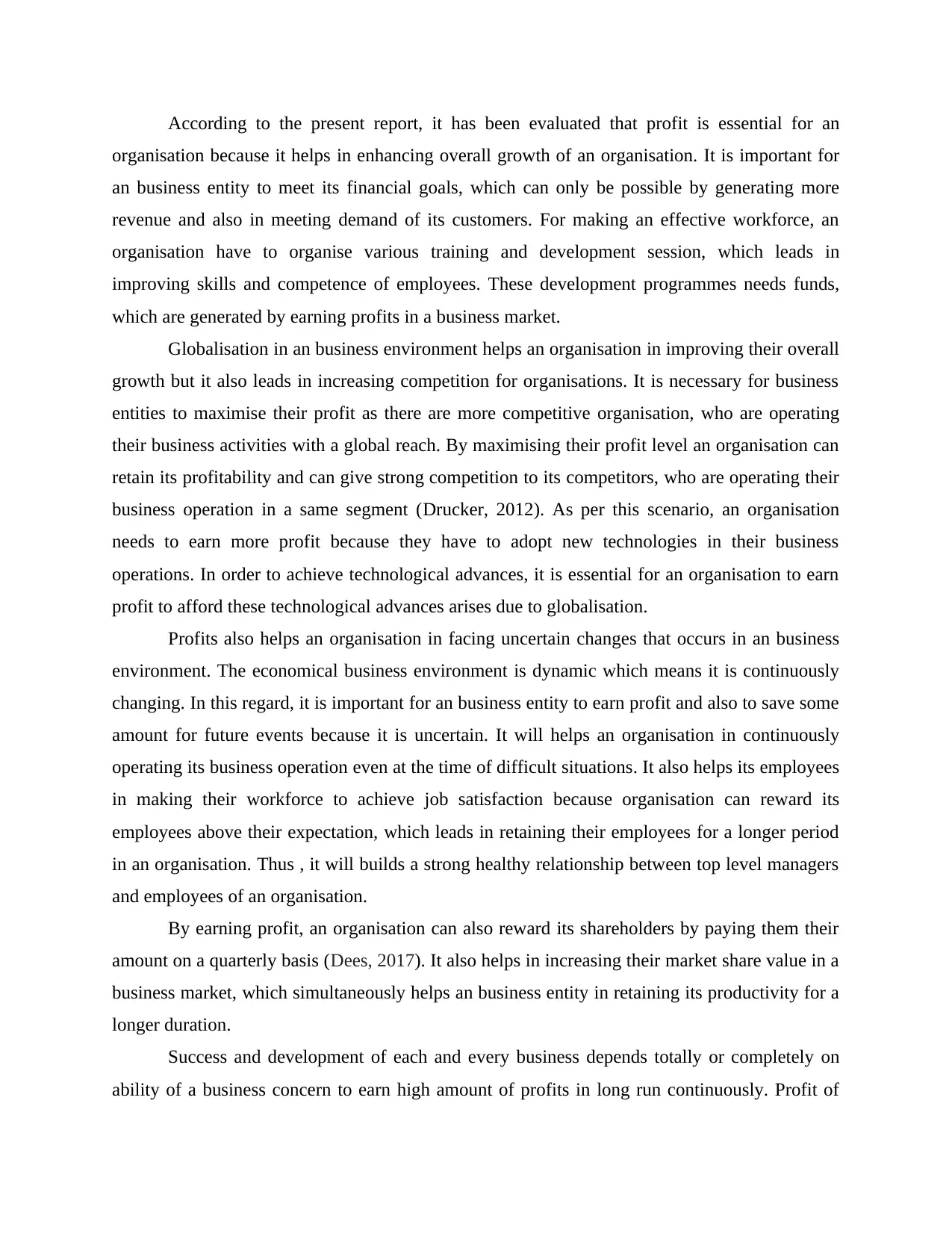
According to the present report, it has been evaluated that profit is essential for an
organisation because it helps in enhancing overall growth of an organisation. It is important for
an business entity to meet its financial goals, which can only be possible by generating more
revenue and also in meeting demand of its customers. For making an effective workforce, an
organisation have to organise various training and development session, which leads in
improving skills and competence of employees. These development programmes needs funds,
which are generated by earning profits in a business market.
Globalisation in an business environment helps an organisation in improving their overall
growth but it also leads in increasing competition for organisations. It is necessary for business
entities to maximise their profit as there are more competitive organisation, who are operating
their business activities with a global reach. By maximising their profit level an organisation can
retain its profitability and can give strong competition to its competitors, who are operating their
business operation in a same segment (Drucker, 2012). As per this scenario, an organisation
needs to earn more profit because they have to adopt new technologies in their business
operations. In order to achieve technological advances, it is essential for an organisation to earn
profit to afford these technological advances arises due to globalisation.
Profits also helps an organisation in facing uncertain changes that occurs in an business
environment. The economical business environment is dynamic which means it is continuously
changing. In this regard, it is important for an business entity to earn profit and also to save some
amount for future events because it is uncertain. It will helps an organisation in continuously
operating its business operation even at the time of difficult situations. It also helps its employees
in making their workforce to achieve job satisfaction because organisation can reward its
employees above their expectation, which leads in retaining their employees for a longer period
in an organisation. Thus , it will builds a strong healthy relationship between top level managers
and employees of an organisation.
By earning profit, an organisation can also reward its shareholders by paying them their
amount on a quarterly basis (Dees, 2017). It also helps in increasing their market share value in a
business market, which simultaneously helps an business entity in retaining its productivity for a
longer duration.
Success and development of each and every business depends totally or completely on
ability of a business concern to earn high amount of profits in long run continuously. Profit of
organisation because it helps in enhancing overall growth of an organisation. It is important for
an business entity to meet its financial goals, which can only be possible by generating more
revenue and also in meeting demand of its customers. For making an effective workforce, an
organisation have to organise various training and development session, which leads in
improving skills and competence of employees. These development programmes needs funds,
which are generated by earning profits in a business market.
Globalisation in an business environment helps an organisation in improving their overall
growth but it also leads in increasing competition for organisations. It is necessary for business
entities to maximise their profit as there are more competitive organisation, who are operating
their business activities with a global reach. By maximising their profit level an organisation can
retain its profitability and can give strong competition to its competitors, who are operating their
business operation in a same segment (Drucker, 2012). As per this scenario, an organisation
needs to earn more profit because they have to adopt new technologies in their business
operations. In order to achieve technological advances, it is essential for an organisation to earn
profit to afford these technological advances arises due to globalisation.
Profits also helps an organisation in facing uncertain changes that occurs in an business
environment. The economical business environment is dynamic which means it is continuously
changing. In this regard, it is important for an business entity to earn profit and also to save some
amount for future events because it is uncertain. It will helps an organisation in continuously
operating its business operation even at the time of difficult situations. It also helps its employees
in making their workforce to achieve job satisfaction because organisation can reward its
employees above their expectation, which leads in retaining their employees for a longer period
in an organisation. Thus , it will builds a strong healthy relationship between top level managers
and employees of an organisation.
By earning profit, an organisation can also reward its shareholders by paying them their
amount on a quarterly basis (Dees, 2017). It also helps in increasing their market share value in a
business market, which simultaneously helps an business entity in retaining its productivity for a
longer duration.
Success and development of each and every business depends totally or completely on
ability of a business concern to earn high amount of profits in long run continuously. Profit of
⊘ This is a preview!⊘
Do you want full access?
Subscribe today to unlock all pages.

Trusted by 1+ million students worldwide
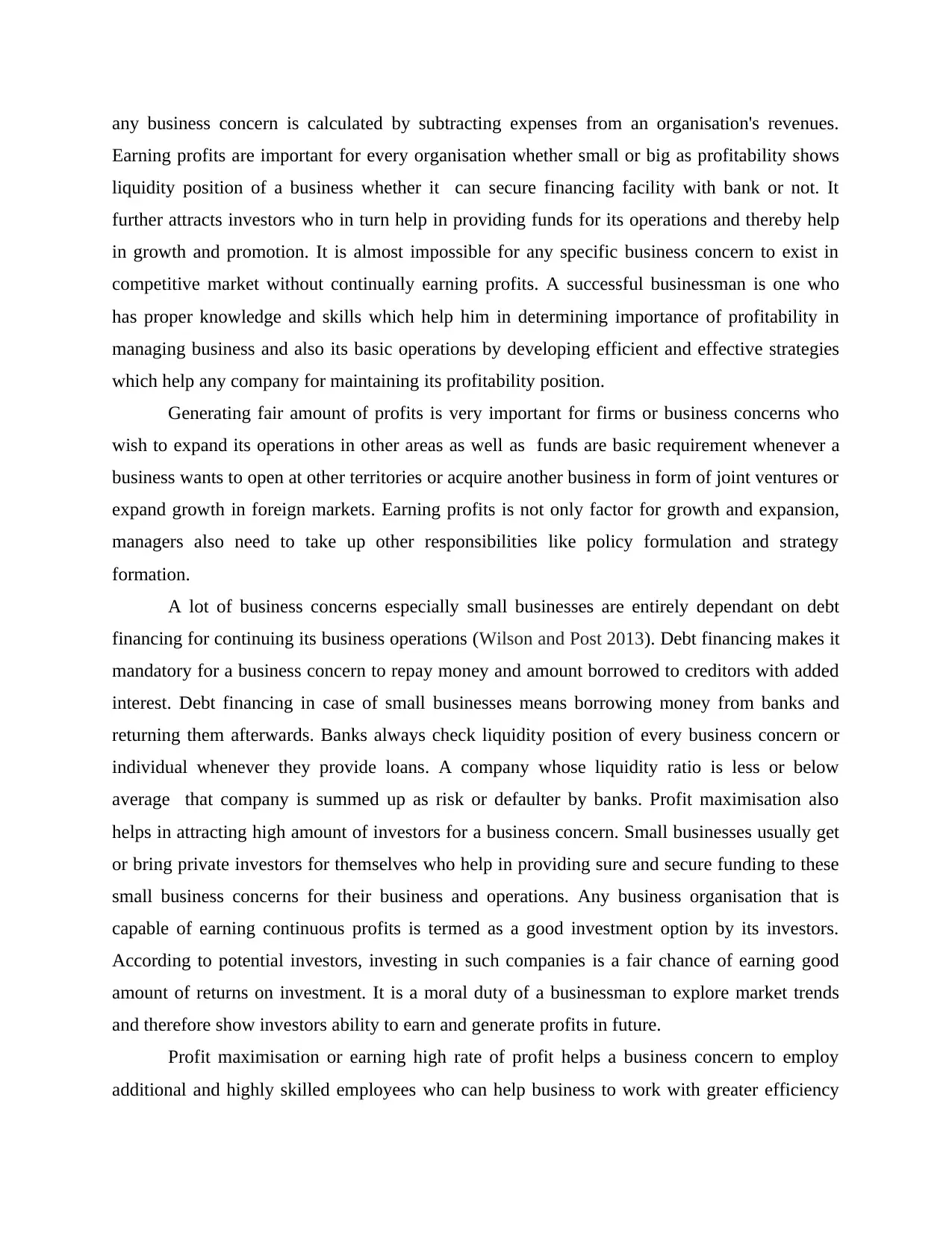
any business concern is calculated by subtracting expenses from an organisation's revenues.
Earning profits are important for every organisation whether small or big as profitability shows
liquidity position of a business whether it can secure financing facility with bank or not. It
further attracts investors who in turn help in providing funds for its operations and thereby help
in growth and promotion. It is almost impossible for any specific business concern to exist in
competitive market without continually earning profits. A successful businessman is one who
has proper knowledge and skills which help him in determining importance of profitability in
managing business and also its basic operations by developing efficient and effective strategies
which help any company for maintaining its profitability position.
Generating fair amount of profits is very important for firms or business concerns who
wish to expand its operations in other areas as well as funds are basic requirement whenever a
business wants to open at other territories or acquire another business in form of joint ventures or
expand growth in foreign markets. Earning profits is not only factor for growth and expansion,
managers also need to take up other responsibilities like policy formulation and strategy
formation.
A lot of business concerns especially small businesses are entirely dependant on debt
financing for continuing its business operations (Wilson and Post 2013). Debt financing makes it
mandatory for a business concern to repay money and amount borrowed to creditors with added
interest. Debt financing in case of small businesses means borrowing money from banks and
returning them afterwards. Banks always check liquidity position of every business concern or
individual whenever they provide loans. A company whose liquidity ratio is less or below
average that company is summed up as risk or defaulter by banks. Profit maximisation also
helps in attracting high amount of investors for a business concern. Small businesses usually get
or bring private investors for themselves who help in providing sure and secure funding to these
small business concerns for their business and operations. Any business organisation that is
capable of earning continuous profits is termed as a good investment option by its investors.
According to potential investors, investing in such companies is a fair chance of earning good
amount of returns on investment. It is a moral duty of a businessman to explore market trends
and therefore show investors ability to earn and generate profits in future.
Profit maximisation or earning high rate of profit helps a business concern to employ
additional and highly skilled employees who can help business to work with greater efficiency
Earning profits are important for every organisation whether small or big as profitability shows
liquidity position of a business whether it can secure financing facility with bank or not. It
further attracts investors who in turn help in providing funds for its operations and thereby help
in growth and promotion. It is almost impossible for any specific business concern to exist in
competitive market without continually earning profits. A successful businessman is one who
has proper knowledge and skills which help him in determining importance of profitability in
managing business and also its basic operations by developing efficient and effective strategies
which help any company for maintaining its profitability position.
Generating fair amount of profits is very important for firms or business concerns who
wish to expand its operations in other areas as well as funds are basic requirement whenever a
business wants to open at other territories or acquire another business in form of joint ventures or
expand growth in foreign markets. Earning profits is not only factor for growth and expansion,
managers also need to take up other responsibilities like policy formulation and strategy
formation.
A lot of business concerns especially small businesses are entirely dependant on debt
financing for continuing its business operations (Wilson and Post 2013). Debt financing makes it
mandatory for a business concern to repay money and amount borrowed to creditors with added
interest. Debt financing in case of small businesses means borrowing money from banks and
returning them afterwards. Banks always check liquidity position of every business concern or
individual whenever they provide loans. A company whose liquidity ratio is less or below
average that company is summed up as risk or defaulter by banks. Profit maximisation also
helps in attracting high amount of investors for a business concern. Small businesses usually get
or bring private investors for themselves who help in providing sure and secure funding to these
small business concerns for their business and operations. Any business organisation that is
capable of earning continuous profits is termed as a good investment option by its investors.
According to potential investors, investing in such companies is a fair chance of earning good
amount of returns on investment. It is a moral duty of a businessman to explore market trends
and therefore show investors ability to earn and generate profits in future.
Profit maximisation or earning high rate of profit helps a business concern to employ
additional and highly skilled employees who can help business to work with greater efficiency
Paraphrase This Document
Need a fresh take? Get an instant paraphrase of this document with our AI Paraphraser
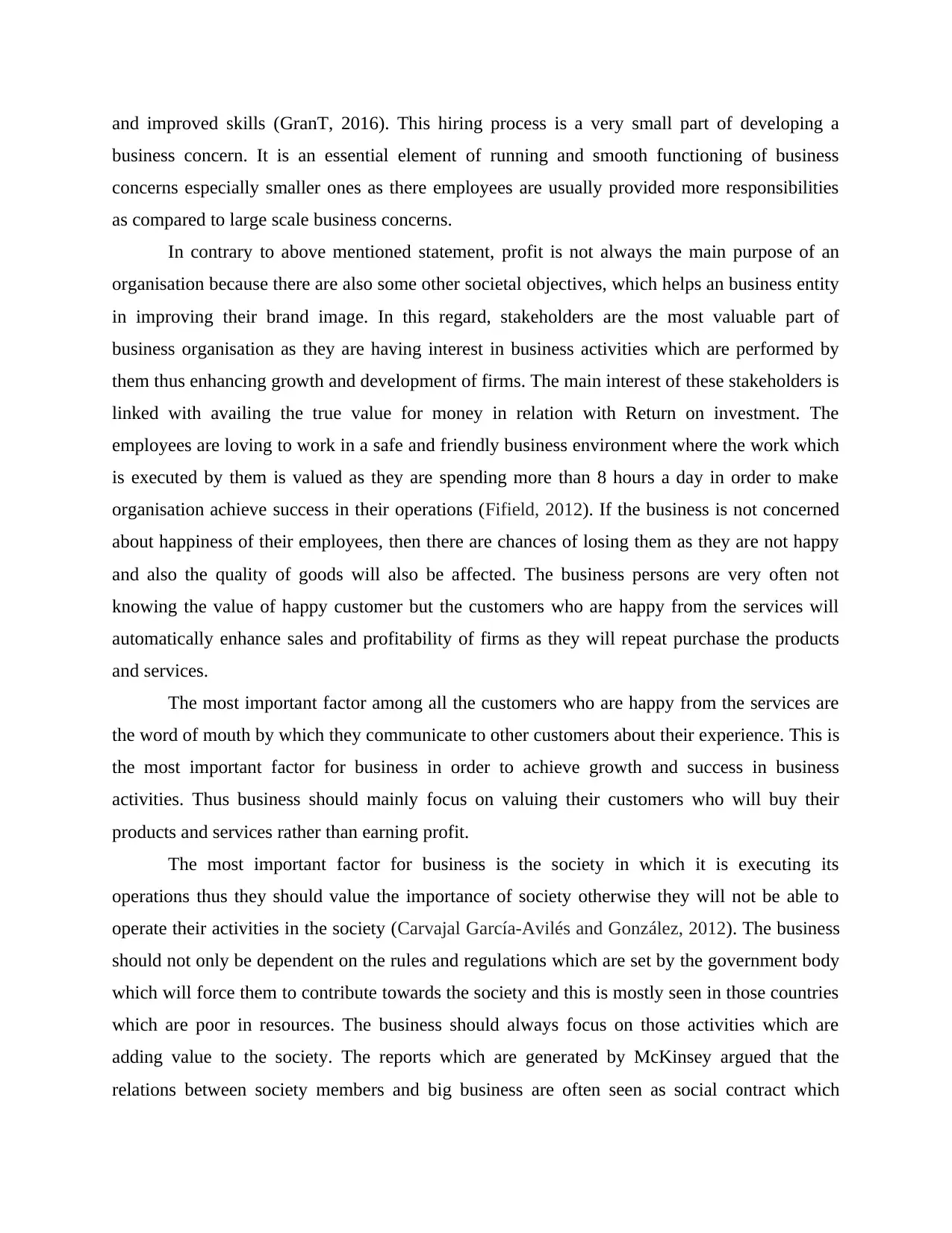
and improved skills (GranT, 2016). This hiring process is a very small part of developing a
business concern. It is an essential element of running and smooth functioning of business
concerns especially smaller ones as there employees are usually provided more responsibilities
as compared to large scale business concerns.
In contrary to above mentioned statement, profit is not always the main purpose of an
organisation because there are also some other societal objectives, which helps an business entity
in improving their brand image. In this regard, stakeholders are the most valuable part of
business organisation as they are having interest in business activities which are performed by
them thus enhancing growth and development of firms. The main interest of these stakeholders is
linked with availing the true value for money in relation with Return on investment. The
employees are loving to work in a safe and friendly business environment where the work which
is executed by them is valued as they are spending more than 8 hours a day in order to make
organisation achieve success in their operations (Fifield, 2012). If the business is not concerned
about happiness of their employees, then there are chances of losing them as they are not happy
and also the quality of goods will also be affected. The business persons are very often not
knowing the value of happy customer but the customers who are happy from the services will
automatically enhance sales and profitability of firms as they will repeat purchase the products
and services.
The most important factor among all the customers who are happy from the services are
the word of mouth by which they communicate to other customers about their experience. This is
the most important factor for business in order to achieve growth and success in business
activities. Thus business should mainly focus on valuing their customers who will buy their
products and services rather than earning profit.
The most important factor for business is the society in which it is executing its
operations thus they should value the importance of society otherwise they will not be able to
operate their activities in the society (Carvajal García-Avilés and González, 2012). The business
should not only be dependent on the rules and regulations which are set by the government body
which will force them to contribute towards the society and this is mostly seen in those countries
which are poor in resources. The business should always focus on those activities which are
adding value to the society. The reports which are generated by McKinsey argued that the
relations between society members and big business are often seen as social contract which
business concern. It is an essential element of running and smooth functioning of business
concerns especially smaller ones as there employees are usually provided more responsibilities
as compared to large scale business concerns.
In contrary to above mentioned statement, profit is not always the main purpose of an
organisation because there are also some other societal objectives, which helps an business entity
in improving their brand image. In this regard, stakeholders are the most valuable part of
business organisation as they are having interest in business activities which are performed by
them thus enhancing growth and development of firms. The main interest of these stakeholders is
linked with availing the true value for money in relation with Return on investment. The
employees are loving to work in a safe and friendly business environment where the work which
is executed by them is valued as they are spending more than 8 hours a day in order to make
organisation achieve success in their operations (Fifield, 2012). If the business is not concerned
about happiness of their employees, then there are chances of losing them as they are not happy
and also the quality of goods will also be affected. The business persons are very often not
knowing the value of happy customer but the customers who are happy from the services will
automatically enhance sales and profitability of firms as they will repeat purchase the products
and services.
The most important factor among all the customers who are happy from the services are
the word of mouth by which they communicate to other customers about their experience. This is
the most important factor for business in order to achieve growth and success in business
activities. Thus business should mainly focus on valuing their customers who will buy their
products and services rather than earning profit.
The most important factor for business is the society in which it is executing its
operations thus they should value the importance of society otherwise they will not be able to
operate their activities in the society (Carvajal García-Avilés and González, 2012). The business
should not only be dependent on the rules and regulations which are set by the government body
which will force them to contribute towards the society and this is mostly seen in those countries
which are poor in resources. The business should always focus on those activities which are
adding value to the society. The reports which are generated by McKinsey argued that the
relations between society members and big business are often seen as social contract which
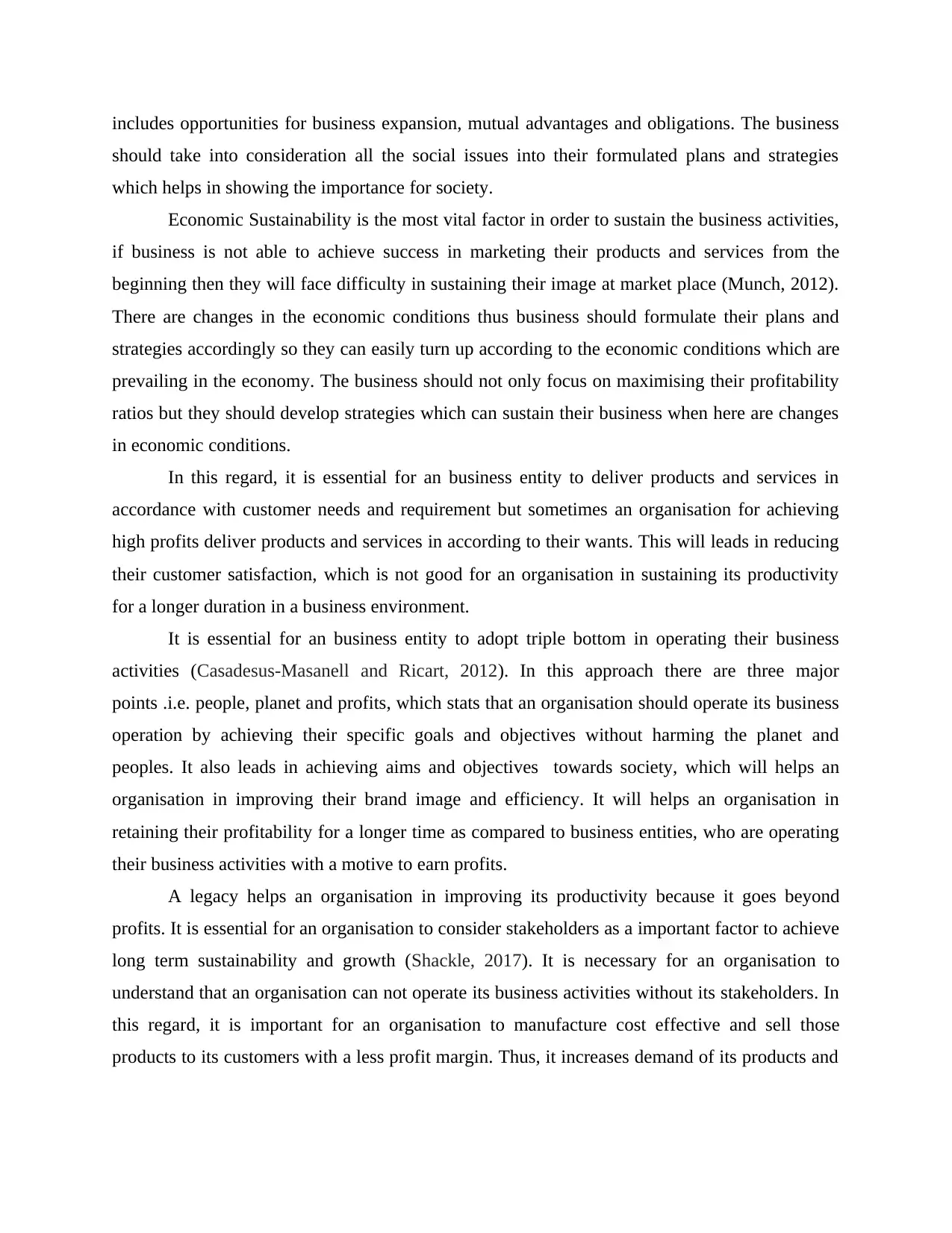
includes opportunities for business expansion, mutual advantages and obligations. The business
should take into consideration all the social issues into their formulated plans and strategies
which helps in showing the importance for society.
Economic Sustainability is the most vital factor in order to sustain the business activities,
if business is not able to achieve success in marketing their products and services from the
beginning then they will face difficulty in sustaining their image at market place (Munch, 2012).
There are changes in the economic conditions thus business should formulate their plans and
strategies accordingly so they can easily turn up according to the economic conditions which are
prevailing in the economy. The business should not only focus on maximising their profitability
ratios but they should develop strategies which can sustain their business when here are changes
in economic conditions.
In this regard, it is essential for an business entity to deliver products and services in
accordance with customer needs and requirement but sometimes an organisation for achieving
high profits deliver products and services in according to their wants. This will leads in reducing
their customer satisfaction, which is not good for an organisation in sustaining its productivity
for a longer duration in a business environment.
It is essential for an business entity to adopt triple bottom in operating their business
activities (Casadesus-Masanell and Ricart, 2012). In this approach there are three major
points .i.e. people, planet and profits, which stats that an organisation should operate its business
operation by achieving their specific goals and objectives without harming the planet and
peoples. It also leads in achieving aims and objectives towards society, which will helps an
organisation in improving their brand image and efficiency. It will helps an organisation in
retaining their profitability for a longer time as compared to business entities, who are operating
their business activities with a motive to earn profits.
A legacy helps an organisation in improving its productivity because it goes beyond
profits. It is essential for an organisation to consider stakeholders as a important factor to achieve
long term sustainability and growth (Shackle, 2017). It is necessary for an organisation to
understand that an organisation can not operate its business activities without its stakeholders. In
this regard, it is important for an organisation to manufacture cost effective and sell those
products to its customers with a less profit margin. Thus, it increases demand of its products and
should take into consideration all the social issues into their formulated plans and strategies
which helps in showing the importance for society.
Economic Sustainability is the most vital factor in order to sustain the business activities,
if business is not able to achieve success in marketing their products and services from the
beginning then they will face difficulty in sustaining their image at market place (Munch, 2012).
There are changes in the economic conditions thus business should formulate their plans and
strategies accordingly so they can easily turn up according to the economic conditions which are
prevailing in the economy. The business should not only focus on maximising their profitability
ratios but they should develop strategies which can sustain their business when here are changes
in economic conditions.
In this regard, it is essential for an business entity to deliver products and services in
accordance with customer needs and requirement but sometimes an organisation for achieving
high profits deliver products and services in according to their wants. This will leads in reducing
their customer satisfaction, which is not good for an organisation in sustaining its productivity
for a longer duration in a business environment.
It is essential for an business entity to adopt triple bottom in operating their business
activities (Casadesus-Masanell and Ricart, 2012). In this approach there are three major
points .i.e. people, planet and profits, which stats that an organisation should operate its business
operation by achieving their specific goals and objectives without harming the planet and
peoples. It also leads in achieving aims and objectives towards society, which will helps an
organisation in improving their brand image and efficiency. It will helps an organisation in
retaining their profitability for a longer time as compared to business entities, who are operating
their business activities with a motive to earn profits.
A legacy helps an organisation in improving its productivity because it goes beyond
profits. It is essential for an organisation to consider stakeholders as a important factor to achieve
long term sustainability and growth (Shackle, 2017). It is necessary for an organisation to
understand that an organisation can not operate its business activities without its stakeholders. In
this regard, it is important for an organisation to manufacture cost effective and sell those
products to its customers with a less profit margin. Thus, it increases demand of its products and
⊘ This is a preview!⊘
Do you want full access?
Subscribe today to unlock all pages.

Trusted by 1+ million students worldwide
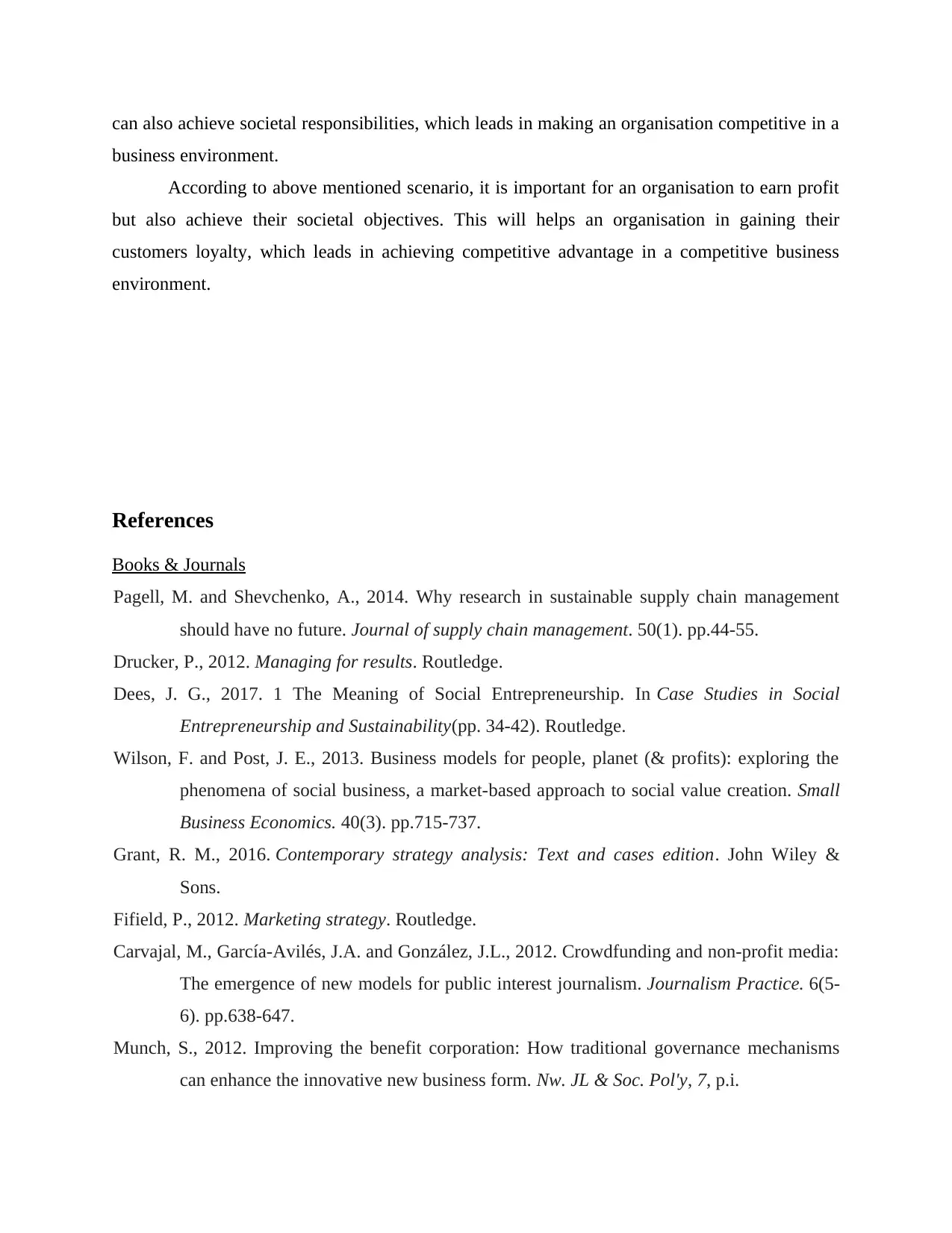
can also achieve societal responsibilities, which leads in making an organisation competitive in a
business environment.
According to above mentioned scenario, it is important for an organisation to earn profit
but also achieve their societal objectives. This will helps an organisation in gaining their
customers loyalty, which leads in achieving competitive advantage in a competitive business
environment.
References
Books & Journals
Pagell, M. and Shevchenko, A., 2014. Why research in sustainable supply chain management
should have no future. Journal of supply chain management. 50(1). pp.44-55.
Drucker, P., 2012. Managing for results. Routledge.
Dees, J. G., 2017. 1 The Meaning of Social Entrepreneurship. In Case Studies in Social
Entrepreneurship and Sustainability(pp. 34-42). Routledge.
Wilson, F. and Post, J. E., 2013. Business models for people, planet (& profits): exploring the
phenomena of social business, a market-based approach to social value creation. Small
Business Economics. 40(3). pp.715-737.
Grant, R. M., 2016. Contemporary strategy analysis: Text and cases edition. John Wiley &
Sons.
Fifield, P., 2012. Marketing strategy. Routledge.
Carvajal, M., García-Avilés, J.A. and González, J.L., 2012. Crowdfunding and non-profit media:
The emergence of new models for public interest journalism. Journalism Practice. 6(5-
6). pp.638-647.
Munch, S., 2012. Improving the benefit corporation: How traditional governance mechanisms
can enhance the innovative new business form. Nw. JL & Soc. Pol'y, 7, p.i.
business environment.
According to above mentioned scenario, it is important for an organisation to earn profit
but also achieve their societal objectives. This will helps an organisation in gaining their
customers loyalty, which leads in achieving competitive advantage in a competitive business
environment.
References
Books & Journals
Pagell, M. and Shevchenko, A., 2014. Why research in sustainable supply chain management
should have no future. Journal of supply chain management. 50(1). pp.44-55.
Drucker, P., 2012. Managing for results. Routledge.
Dees, J. G., 2017. 1 The Meaning of Social Entrepreneurship. In Case Studies in Social
Entrepreneurship and Sustainability(pp. 34-42). Routledge.
Wilson, F. and Post, J. E., 2013. Business models for people, planet (& profits): exploring the
phenomena of social business, a market-based approach to social value creation. Small
Business Economics. 40(3). pp.715-737.
Grant, R. M., 2016. Contemporary strategy analysis: Text and cases edition. John Wiley &
Sons.
Fifield, P., 2012. Marketing strategy. Routledge.
Carvajal, M., García-Avilés, J.A. and González, J.L., 2012. Crowdfunding and non-profit media:
The emergence of new models for public interest journalism. Journalism Practice. 6(5-
6). pp.638-647.
Munch, S., 2012. Improving the benefit corporation: How traditional governance mechanisms
can enhance the innovative new business form. Nw. JL & Soc. Pol'y, 7, p.i.
Paraphrase This Document
Need a fresh take? Get an instant paraphrase of this document with our AI Paraphraser
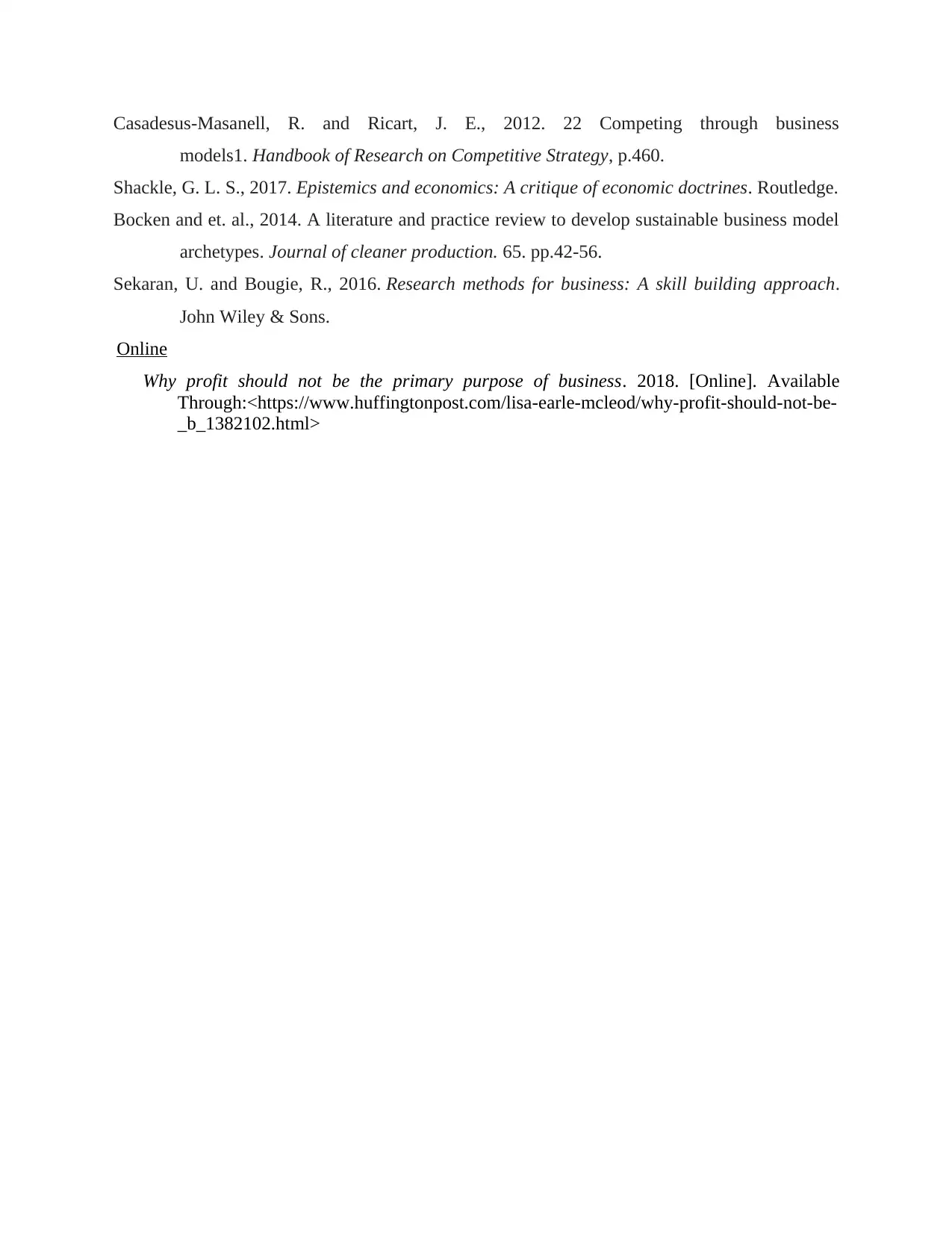
Casadesus-Masanell, R. and Ricart, J. E., 2012. 22 Competing through business
models1. Handbook of Research on Competitive Strategy, p.460.
Shackle, G. L. S., 2017. Epistemics and economics: A critique of economic doctrines. Routledge.
Bocken and et. al., 2014. A literature and practice review to develop sustainable business model
archetypes. Journal of cleaner production. 65. pp.42-56.
Sekaran, U. and Bougie, R., 2016. Research methods for business: A skill building approach.
John Wiley & Sons.
Online
Why profit should not be the primary purpose of business. 2018. [Online]. Available
Through:<https://www.huffingtonpost.com/lisa-earle-mcleod/why-profit-should-not-be-
_b_1382102.html>
models1. Handbook of Research on Competitive Strategy, p.460.
Shackle, G. L. S., 2017. Epistemics and economics: A critique of economic doctrines. Routledge.
Bocken and et. al., 2014. A literature and practice review to develop sustainable business model
archetypes. Journal of cleaner production. 65. pp.42-56.
Sekaran, U. and Bougie, R., 2016. Research methods for business: A skill building approach.
John Wiley & Sons.
Online
Why profit should not be the primary purpose of business. 2018. [Online]. Available
Through:<https://www.huffingtonpost.com/lisa-earle-mcleod/why-profit-should-not-be-
_b_1382102.html>
1 out of 8
Related Documents
Your All-in-One AI-Powered Toolkit for Academic Success.
+13062052269
info@desklib.com
Available 24*7 on WhatsApp / Email
![[object Object]](/_next/static/media/star-bottom.7253800d.svg)
Unlock your academic potential
Copyright © 2020–2025 A2Z Services. All Rights Reserved. Developed and managed by ZUCOL.





